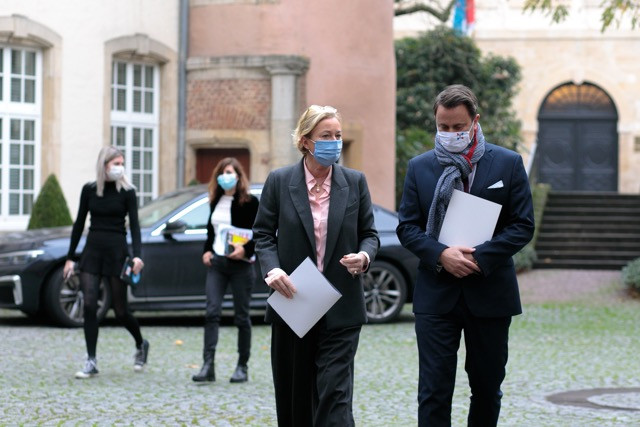2020 began with a cabinet reshuffle sparked by economy minister Étienne Schneider’s decision to quit government after eight years in cabinet. That meant a promotion for his LSAP colleague Franz Fayot, seen by many as being “less business friendly” than Schneider, and also fellow party representative Paulette Lenert being put in charge of the health portfolio. Nobody at the time could have foreseen the enormity of the task that would face Lenert in her first few months in the job. But she proved more than equal to the task, taking centre stage at media briefings where she was a model of calm and level-headedness.
But even when the government faced criticism for its delay in introducing wider restrictions as the number of cases, hospitalisations and fatalities from covid-19 rose rapidly in late autumn, it was prime minister Xavier Bettel who was the target rather than Lenert. His decision to raise the minimum wage by 2.8% was also decried as populist, and not economically viable, by employers.
However, several other policy decisions, notably the spiralling costs of the LuxeoSys military satellite project, a dispute over transparency regarding the memorandum of understanding with Google, and the drawn-out saga over the Fage yoghurt factory, have proven to be embarrassing.
Nevertheless, the government seems to be on track in meeting some of its manifesto promises. Henri Kox, another relatively new minister, has taken the housing crisis to heart and is in the midst of getting much needed reform through parliament. Whether it will be enough remains to be seen.
Tax reform
While there was no specific mention of tax reform as such in the 2018 coalition agreement, the government finance minister Pierre Gramegna (photo) has pledged to introduce a “coherent fiscal policy, responding appropriately to the modern realities and challenges of family, social, economic and ecological policy.” Indeed, the CSV has also been calling for a reform, with MP Gilles Roth saying that “the current tax model no longer corresponds to the reality of society.”
And while it now looks likely that a fully fledged tax reform will not be introduced before 2023--a crucial election year in Luxembourg--changes announced by Xavier Bettel in his state of the nation speech in October of 2020 will have a more immediate impact. These include a 20% tax on direct and indirect revenue from real estate held in specialised investment funds and the abolition of the regime that allows high earners to have some of their income paid in stock options.
On the other hand, while further taxation of high net wealth does not have unanimous backing, CSV president Frank Engel caused a stir when he suggested the idea of the reintroduction of the wealth tax and even a reform of inheritance tax. And with the economic fallout from the health crisis likely to hit state finances hard, this debate will no doubt continue into 2021.
Constitutional reform
While plans to reform the constitution were mooted long before the first so-called Gambia coalition took office in 2013, proposals by the current government for a major overhaul seem likely to result in a watered-down version. Reform of the constitution requires two-thirds majority approval in parliament, and the biggest single party in the Chamber of Deputies, the opposition CSV, has already placed several stumbling blocks in its path. A major spat over the government’s refusal to meet its demands for a consultative process with citizens led to an impasse.
But it is not just political differences that have caused problems. One of the main sticking points is a reform of the judiciary and the formalisation of the independence of the prosecutor’s office vis-à-vis the ministry of justice. Indeed, the administrative justice has said it is unhappy that the judiciary is not being explicitly presented as the third power, alongside the executive and legislative branches.
Reform of the royal court presents less of a problem thanks to the implementation of recommendations in the Waringo report before the summer, which resulted in a shake-up of administrative management at the court.
Each chapter of the renewed Constitution will be presented to parliament as a legislative proposal so that they can be adopted one by one. But Mars Di Bartolomeo, the LSAP chairman of the committee on institutions and constitutional review, has said they could then be cleaned up to make the whole constitution consistent.
